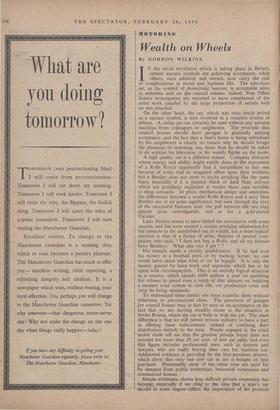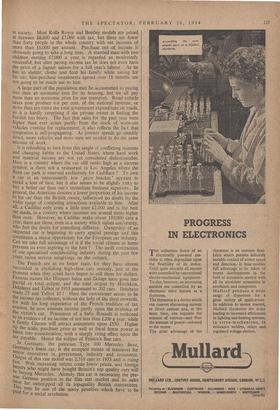MOTORING
Wealth on Wheels
By GORDON WILKINS IN the social revolution which is taking place in Britain, certain success symbols are achieving acceptance, while others, once admired and envied, now carry the risk of complications in social and business life. The television set, as the symbol of democratic 'success, is acceptable alike in suburbia and on the council estates; indeed, Post Office licence investigators are reported to have complained of the extra work entailed by the large proportion of aerials with no sets attached.
On the other hand, the car, which was once much prized as a success symbol, is now involved in a complex system of taboos. A cheap car can certainly be used without any adverse reactions from colleagues or neighbours. The principle that council houses should have garages is gradually gaining acceptance, and the fact that a man's home is being subsidised by his neighbours is clearly no reason why he should forego the pleasures Of motoring, any more than he should be asked to do withOut his television, or his weekly flutter on the pools.
A high quality car is a different matter. Company directors whose energy and ability might entitle them to the enjoyment of a Rolls Royce apparently find it inexpedient to buy one because of some real or imagined effect upon their workers, but a Bentley does not seem to excite anything like the same fears, especially if it is painted black or dark blue, colours which are popularly supposed to render these cars invisible to shop stewards. in price, mechanical design and amenities, the differences between a scarlet Rolls Royce and a navy blue Bentley are of no great significance, but seen through the eyes of the successful business man, the gulf between the two may appear quite unbridgeable, and as for a gold-plated Daimler. .• . .
Lady Docker seems to have defied the convention with some success, and has even excited.a certain grudging admiration for her panache in the uninhibited use of wealth, but a more typical reaction is that of a friend of mine, director of several com- panies; who said, " I dare not buy a Rolls, and all my friends have Bentleys. What else can I get ? "
His remark needs a certain qualification. If he had won his money in a football pool, or by backing horses, no one would have cared what kind of car he bqught. It is only the money gained by hard work and ingenuity which has to be spent with circumspection. This is an entirely logical situation in a country which spends £600 million a year on gambling but refuses to spend even a tenth of that amount on building a modern road system to save life, cut production costs and raise its living standards. 'Ito understand these trends one must examine them without bitterness or preconceived ideas. The provision of 'garages for council houses may in fact be seen as an acceptance of the fact that we are moving steadily closer to the situation in Soviet Russia, where the car is'built in with the job. The main difference is that we still permit private industry to have a part in offering these inducements, instead of confining their distribution entirely to the state. People engaged in the retail motor 'trade tell me that the genuine private buyer does not account for more than 20 per cent. of new car sales, and even this figure includes professional men, such as doctors and lawyers, who are really buying their cars for business use. Additional evidence is provided by the hire-purchase returns, which show that only one new car in ten is bought on hire purchase. Presumably most of the other nine are paid for by cheques from public authorities, industrial companies and commercial houses.
Simple arithmetic shows. how difficult private ownership has become, especially if we cling to the idea 'that a man's car shOuld in some degree' reflect the importance of his position in society. Most Rolls Royce and Bentley models are priced at between £6,000 and £7,000 with tax, but there are fewer than forty people in the whole country with net incomes of more than £6,000 per annum. Purchase out of income. is obviously going to take a long time. A married man-with two children, earning £2,000 a year, is regarded as moderately successful, but after paying income tax he does not even have the price of a Jaguar saloon for a full year's labour. As be has to shelter, clothe and feed his family while saving for his car, hire-purchase instalments spread over 18 months are not going to be much use to him.
A large part of the population may be accustomed to paying less than an economic rent for its housing, but we all pay more than an economic price for our transport. Road vehicle taxes now produce 6.6 per cent. of the national revenue, or more than ten times the total government expenditure on roads, so it is hardly surprising if the private owner is finding the burden too heavy. The fact that sales for the past year were higher than ever arises partly from the stock of worn-out vehicles overdue for replacement; it also reflects the fact that congestion is self-propagating. As journey speeds go steadily down, more vehicles and more men are nezded to do the same amount of work. It is.refreshing to turn from this tangle of conflicting interests and changing habits to the United States, where hard work and material success are not yet considered dishonourable. Here is a country where the car still ranks high as a success symbol; is there not a restaurant in Los Angeles where the front car park is reserved exclusively for Cadillacs ? To own a car in an unnecessarily low ' price bracket' appears to entail a loss of face, but it also seems to be slightly risky to buy a better car than one's immediate business superiors. In general, the American devotes a lower proportion of his income to his car than the British owner, influenced no doubt by the wider range of competing attractions available to him. After all, a Cadillac only costs a little over £2,000 and is the best car made, in a country where incomes are several times higher than ours. However, as Cadillac make about 110,000 cars a year, there are those, even in a society which values con:'ormity, who feel the desire for something different. Ownership of an imported car is beginning to carry special prestige and this constitutes a major opportunity for the European car industry. Can we take full advantage of it if the social climate at home prevents us even aspiring to the best ? The swift contraction of our specialised coachbuilding industry during the past few Years raises serious misgivings on the subject.
The French are in no better state, for they have almost succeeded in abolishing high-class cars entirely, just at the moment when they could have begun to sell them for dollars. Famous names like Hispand Suiza and Delage have gone into partial or total eclipse, and the total output by Hotchkiss, Delahaye and Talbot in 1953 amounted to 202 cars. Delahaye made 25 and Talbot 10 ! Here the executioner seems to be the income tax collector, without the help of the shop stewards, for with his long experience of the French tradition of tax evasion, he now assesses income partly upon the evidence of the victim's car. Possession of a baby Renault is reckoned to be evidence of an income of not less than £200 a year, while a family Citroen will attract assessment upon £550. Higher up the scale, purchase price• as well as fiscal horse power is taken into consideration, with a steeply rising effect upon the tax payable. Hence the eclipse of France's fine cars.



































 Previous page
Previous page